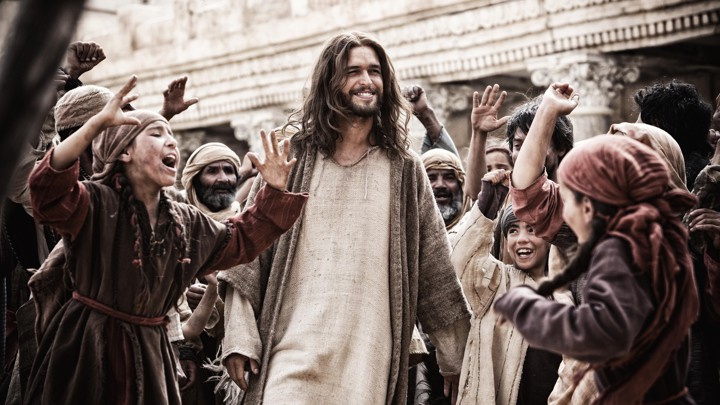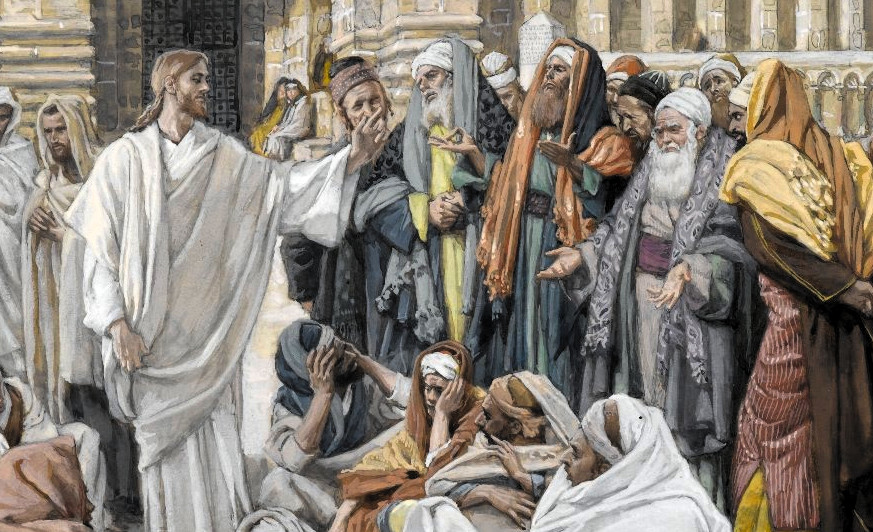
“Do not think that I came to destroy the Law or the Prophets. I did not come to destroy but to fulfill. For assuredly, I say to you, till heaven and earth pass away, one jot or one tittle will by no means pass from the law till all is fulfilled.”
We’ve commented on the false teaching bestowed on us by the Gnostics that the Old Testament has been invalidated by Jesus. Usually the Gnostic demon is invited in when people trample on the nuance introduced by Jesus’ words in today’s meditation, that is, when they get simplistic about Jesus’ words. Let’s dive into the weeds of Jesus’ teaching, or better, the glorious wheat.
First let’s lay something down. Jesus clearly refers to the entire Old Testament here. “Law or the Prophets” is another way of saying “everything written down before My advent.” So, when He speaks of “one jot or one tittle,” He’s not just talking about the Ten Commandments, or the laws and ordinances of the Torah. He’s talking about every word of the Old Testament.
Now let’s look at Gnostic antinomianism, that is, their abuse of what Jesus did with the Law. There are several layers to their abuse, both ancient and modern.
At one level, Gnostics run with St. Paul’s supposed theology that the Gospel does away with the Law, meaning the Ten Commandments. There is a subtle philosophical backdrop to their antinomianism here. As we’ve meditated on before, the Ten Commandments codify a world order in which material and substantial reality is deemed good, just as the Lord said in the beginning. The idea that there is a God among others, with a name and a day, who is to be worshiped; the idea that parental authority, marriage, bodily life, property, and reputation are honored; this can only happen in a world of substantial and material existence.
The Gnostics wouldn’t have this problem – their God was above names and places, and all things of this world order like marriage, family, and bodily life were deemed deceptive entrapments of the Self. For them, Jesus represented the radical undoing of the world order assumed by the Ten Commandments. Jesus represented the radical liberation from such a world. He was the first free-spirited hippy.
At another level – and here there is more intersection with modern Gnostics, particularly in the Church – the Gnostics rejected the formalism and ritualism of the Old Testament sacrificial system, with its intermediaries, hierarchies, and seemingly “rote” worship. By this reading – a very wrong one – the Pharisees represented the Old Testament way of doing things – they were carrying on the Old Testament ways of worship – but Jesus came to undo all that. He came to introduce more “heartfelt” worship free of ritual and formalism.
Today’s Gospel answers the first Gnostic antinomian abuse. Jesus did not come to invalidate (and that’s perhaps a more accurate word than “destroy”) the Old Testament Law, but to fulfill it. Fulfilling is different than invalidating. One says you can cheat on your wife because the Law is no longer in effect, and in fact by doing so you’re revolting against the oppressive institution of marriage. The other says (a) you cheat on your wife way more than you thought you did, and (b) Jesus had to suffer and die so that you can claim, in Him, the righteous way of keeping this Law, for which you hunger and thirst. Fulfilling the Law meant Jesus’ blood sanctifying it and upholding it, the very blood for which we thirst, suggesting a massive abuse of God’s Law if ever we treat it as unimportant.
Jesus echoes this point when He talks about those who break one of the least of these commandments, or teach men so. That all-encompassing absoluteness forecasts the blood He would shed for each dot and tittle.
As to the second Gnostic abuse, the idea that the formalism and ritualism of the sacrificial system will be replaced by a more “spiritual” worship, we need to remember what proper “spirituality” is. Spirituality is formal, because Jesus is formal, because Jesus is God taking on the “form” of a bondservant, that is, human flesh and blood. The moment God set up a boundary at which point He ended and others began, formalism became the way of all spirituality.
Actually, this formal aspect of spiritual began way before then. The Holy Spirit has always been setting up formal boundaries governed by formal words. It’s what He does since the beginning. And what is “to sanctify” but to set something aside – some formal thing – for God’s purpose? As in, the Lord’s sanctifying of the Sabbath Day.
Ritualism flows from the words which go hand in hand with the Holy Spirit’s designation of formal, holy things and peoples. Again, as with each day of creation, on which the Lord (a) separated one thing from another, (b) named it, and (c) declared it good, the same is true with the Holy Spirit’s work throughout Scripture. Ritualism follows from formalism, and this is good.
So, for instance, think of the Holy Spirit separating us from the world in Holy Baptism, to be children of God. What words accompany that act of separating us formally from the world? “In the name of the Father and of the Son and of the Holy Spirit,” but also “Our Father, who art in heaven…,” words which the Spirit cries in us to the Father through Christ, which Jesus commands us to speak.
Those words testify to the new, eternal status we have, and the nature of eternally, unchanging things is, in time, they can become rote. Goodness, the angels will be singing “holy, holy, holy” eternally. My guess is at the eternal level we’ll appreciate that more than we do on earth, where time turns repeated things into rote-ness, and therefore “boring” and then, due to the continued influence of the Romantic movement on our culture, un-spiritual. But if “rote” is “unspiritual,” then the entire Psalms would need to be discarded.
Here’s another example. The Holy Spirit separated Jesus from the world at His baptism, and the words accompanying this action declared it good: “This is my beloved Son, in whom I am well pleased.” And then at the Transfiguration the Lord added to these words, “Listen to Him” after which Jesus told the disciples to stand up. That eternal truth – that Jesus is God’s Son Whose words we should stand up and listen to – has resulted in the ritual we do at the reading of the Holy Gospel. Ritual is nothing more than the involvement of bodies in truths that don’t change.
The only way to undo formalism and ritual is to accept the Gnostic notion that the formal designations set up by the Holy Spirit at Christ’s advent are no longer in effect, and in fact are a corruption of what the Spirit may be doing now in the Church, that is, speaking new things through people’s hearts and feelings.
Now, how exactly does Jesus fulfill the Law? What does this mean and what does it not mean?
In the immediate context it means He’s giving the true meaning of it. It reminds us of St. Paul’s “pedagogue” analogy, that the Law is our school master who teaches us to say “Please” and “thank you,” to shake hands, to keep our elbows off the table, and so on. We don’t know why we’re doing that, but later in life we learn why it’s important.
Why do we shake hands with right hands? The Gnostic would rebel against that formal custom and claim it entraps us in some societal structure, oppressing us. Jesus would teach us we do that because we love our neighbor. As a child you don’t fully understand love of neighbor. But once you grow up, the love of neighbor is part of us, and we seek ways to show our love, and thank God that formal custom is in place! Thank God there are all these forms we can pick up and use to express our love!
So, the Christian would never call someone names or hate them. How could he in a world the Father has created in His image and Christ has died for? He could never hold someone in contempt, or wish his non-existence. Insofar as the Gospel becomes part of us, a “Gospel” view of others becomes part of us. So now, the commandment “Thou shall not kill” becomes the form we pick up to express that attitude, understanding it as Martin Luther does in the Small Catechism, that this means helping him in every bodily need.
Jesus also fulfills the Law, of course, by dying for it. As St. Paul said, all the requirements of the Law were nailed to the cross. Here, “Law” suggests the moral law – what sins did Jesus die for, after all, but those against the moral law of the Old Testament? But what about “Law” understood as beyond the moral commandments? And what about the fuller implication of the text suggested by “the Law and prophets”? Jesus fulfills all that as well.
The Law beyond the moral commandments would be the sacrificial laws and civil ordinances. We can see how Jesus fulfills the sacrificial laws, obviously. He’s the high priest, the lamb, the tabernacle, the temple, the light, and everything spelled out in the Law.
What about the civil laws? How does Jesus fulfill suffering not a witch to live, the law which, because no one in their right mind would kill witches today evidently proves the entire Scriptures are nonsense that we need not ever heed unless it supports something progressive? Of course, whenever people bring up the witches rule – almost always to deflate the Old Testament injunction against men lying with other men – they forget there are different Old Testament laws and Jesus fulfills them in different ways.
Jesus fulfilled the moral law by dying for the sins against it. He fulfilled the ceremonial law by becoming the substance of the foreshadow given in the original context. He fulfills the civil law in the Church, somehow, and this requires a bit more careful theologizing on our part, quite frankly.
The Church is the new Israel. It has to be if Jesus fulfills every tittle of the Law and prophets. This, by the way, to cut a long devotion shorter, explains how Jesus fulfills the “law and prophet” understood as the whole Old Testament. All those confusing passages the dispensationalists use to refer to the modern state of Israel, Jesus says He fulfills.
So, for example, if Jesus indeed fulfills every dot and tittle of the Old Testament, He fulfills whatever dimensions Ezekiel is giving regarding the new temple. He fulfills these words, not some modern re-building of the temple in Jerusalem. And the Church is His body. So yes, the Church is the new Israel which fulfills every – every! – dot and tittle of the Old Testament, including the civil laws.
Here’s where things get interesting, because the civil laws had a specific context which in our modern context has two unique interpretations. Consider “Suffer not a witch to live.”
On one hand, there are implications for the Church. Witches embraced wrong gods and false religion; they were to be ejected from the people of God. The Church since the Middle Ages – in keeping with early Church practice – rightly doesn’t kill heretics. But it certainly takes a harsh, strict stance against heresy, as it should.
But on the other hand, there’s a secular implication. Witches were not only heretics relative to God’s people and His doctrine. They were also insurrectionists who threatened to unravel Israel’s constitutional order. Doesn’t the US still have the death penalty for traitors and insurrectionists? Of course they do, because just about every nation does.
We could go on and on with various Old Testament laws and prophecies. We’ve given just a few examples. But Jesus is giving some pretty all-encompassing teaching about His relation to the Old Testament. He doesn’t invalidate it. He fulfills it. There isn’t a single teaching of the Old Testament that somehow we can’t show to reveal and support Christ, His teaching, and His ministry.
Though this general teaching is all-encompassing, the specific application regarding individual Old Testament teachings requires subtle and flexible thinking. I personally find it one of the most fun tasks as a preacher, to find Christ under every Old Testament rock and to see how He fulfills every jot and tittle of its words.
And in fact, as we said, we get in trouble when we apply general rules and principles to solve specific issues. “Jesus fulfills the Old Testament, therefore Old Testament statements about homosexuality don’t apply.” “Jesus ended the ritualism of the Old Testament, therefore anything smacking of formalism or rote-ness is ‘Pharisaical’.” These are misapplications of Jesus’ teaching, and far be it from anyone to teach anything but the absolute importance of every jot and tittle of God’s Law.
:max_bytes(150000):strip_icc()/JesusFeeds5000-587837712-5c8698ed46e0fb00017b3142.jpg)








